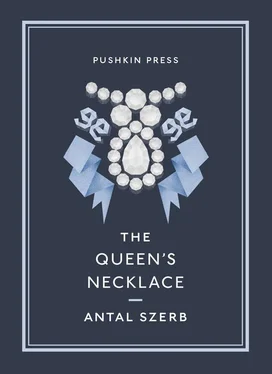But while the blundering ambassador slandered Vienna in Versailles, he took every opportunity to slander Versailles in Vienna. Stories that he was spreading about Marie-Antoinette reached Maria Theresa’s ear. Her maternal heart was so aggrieved that she sent Baron Neni to find out what truth there was in them, and the Baron established that Rohan’s source was baseless chatter emanating from the Du Barry-Marsan-Guéménée clique, who so despised the young Queen.
So it was perfectly understandable that Marie-Antoinette too should do everything in her power to have the doubly indiscreet ambassador brought home. But Rohan was protected by his powerful aunts, and while Louis XV was alive, and Mme du Barry remained who she was, it was impossible to remove him.
In April 1774 Louis XV contracted smallpox. Du Barry took herself off to Rueil, and only his daughters remained at his bedside. The Court continued at Versailles, waiting impatiently for the candle burning in his window to signal that his appalling death struggles were over, so they could then leave the infected Palace and withdraw to Choisy. Finally, on 10th May 1774, the flame was extinguished.
The King’s corpse lay there, slowly breaking open. It was already half-decayed, and a hideous stench was pouring from it. The Duc de Villequier, Premier Gentilhomme de la Chambre , called on the surgeon, Andouillé, to carry out his traditional office and apply balsam to the body. Andouillé knew that it would inevitably mean catching the infection himself, and replied: “Very good; but it is your duty, Your Excellency, to hold the head while I do it.” Villequier dispensed with the embalming.
“The Dauphin was with the Dauphine,” records Mme Campan. “They were awaiting news of Louis’s death together. A dreadful noise, absolument like thunder, was heard in the outer apartment above them. It was the crowd of courtiers who were deserting the dead sovereign’s antechamber, to come and do homage to the new power of Louis XVI. This extraordinary tumult informed Marie-Antoinette and her husband that they were called to the throne; and, by a spontaneous movement, which deeply affected those around them, they threw themselves on their knees; both, pouring forth a flood of tears, exclaimed: “O God, guide us and protect us. We are too young to reign.”
Thus Marie-Antoinette ascended the French throne. That same year Rohan was recalled from Vienna.
His departure was not very dignified. Maria Theresa refused to receive him before he left. Rohan sent his friends a portrait of himself engraved on a thin layer of ivory, and such was his popularity that it was much copied onto rings and encircled with pearls and diamonds. Even Chancellor Kaunitz wore one, to the Empress’ intense annoyance.
He was replaced as ambassador to Vienna by Baron Breteuil. Rohan could not forgive the man for succeeding him, and Breteuil was even less forgiving of the hostile treatment he received. When the time came, his loathing would be fatal for Rohan.
Still greater discomfiture awaited the ex-envoy in France. The King received him coldly; the Queen refused even to see him. She simply sent word that he should forward the letter he had brought her from Maria Theresa. Rohan was in disgrace.
In the Ancien Régime, to be disgraced was not necessarily fatal in a material sense. There was no chance of his starving to death. In fact, during his time in this supposed wilderness he achieved one enviable distinction. In 1777 the post of Grand Aumônier —Grand Almoner — which had long been promised him, fell vacant. The incumbent would be the King’s chaplain, the head of his household clergy, and by that token the highest dignitary in the Court. The King was naturally reluctant to let him have it, and Marie-Antoinette protested vehemently. But once again the powerful aunts prevailed — fairy godmothers indeed! — and Rohan was appointed. From then on, the Queen refused to speak to him.
Then Rohan’s uncle died, and he became Bishop of Strasbourg. It was the richest diocese in France. Next, through the intervention of King Stanislas Poniatowski of Poland, he was made a cardinal. He was now a truly imperial prince, the Comte d’Alsace and Abbé de Saint-Vaast (where his stipend of 300,000 livres exceeded even that from Strasbourg), Proviseur of the Sorbonne, Supérieur Général of the Royal Hospice of the Quinze-Vingts, and a Commander of the Order of the Holy Spirit. And all the while, the Queen refused to speak to him.
You, dear reader, would surely, in such circumstances, believe yourself hopelessly lost to her favour; and you would console yourself that its loss was of no material significance, since retaining it was so difficult in practice. But that, my dear reader, is because you are thinking in practical terms — in francs, pengős and honorary titles, and you fail to imagine just what the loss of royal favour would mean to a person of that time. It is an old cliché, but we must spell it out — the King’s favour was the ray of sunlight that gave life to his courtiers, and without it they withered. The King’s favour was the very air, and without it they could not breathe. The King’s favour was the metaphysics through which a courtier was admitted to matters eternal, and without it life was as meaningless as that of a true believer who has lost his God. The loss of favour had broken greater hearts than Rohan’s — think of Racine!
Rohan mobilised everyone and everything. In 1777 Joseph II came to France, and tried to bring his sister round to the cause. The intervention was not a success. Marie-Antoinette heard her brother out coldly, and exasperated him by her non-stop hectoring tone: ‘I am prepared to take advice from my mother,’ she seemed to say, ‘but to my brother I shall speak my mind.’ The only two men she was ready to listen to were the Comte Mercy-Argenteau and her old tutor, the Abbé Vermond. She was too mindful of the Empress’ advice ever to let Rohan worm his way into her favour.
“Men have, indeed, been driven from Court; and borne it, according to ability,” says Carlyle. “A Choiseul, in these very years, retired Parthian-like, with a smile or scowl, and drew half the Court-host with him. Our Wolsey, though once an ego et rex meus , could journey, it is said, without strait-waistcoat, to his monastery, and there, telling beads, look forward to a still longer journey. The melodious, too soft-strung Racine, when his King turned his back on him, emitted one meek wail, and submissively — died. But the case of Coadjutor de Rohan differed from all those. No loyalty was in him that he should die; no self-help, that he should live; no faith, that he should tell beads.” Rohan lived on, to put it in poetical terms, like a winter tree waiting for some fairy-tale spring.
For Rohan — and this really comes as a surprise — was ambitious. Rank and fortune were not enough. He yearned for power. This is particularly surprising because he was clearly not the sort of person for whom power is his natural element, who finds his greatest happiness in determining the fate of others. Had he been that sort of person he would have put his time in Vienna to far better use, and in his role as bishop he would have made his subordinates feel the weight of his authority. But there is no evidence that he did anything of the sort.
What then was the source of this burning ambition? We all live out our lives in terms of roles — or aspire to do so. At the simplest level, this role-play takes an elementary form: a woman might smile and do her hair in the manner of her favourite actress, and even strive to assume her supposed mental attributes. A man will take on the persona of the distinguished physician, the self-sacrificing paterfamilias, the charming bohemian or some other traditional part. On a higher level, nobler and more complicated souls are tempted by the nobler and more complicated roles offered by history and literature — the Muse, the Martyr, the Poète Maudit, the Great Statesman (like Széchenyi) or Voice of the Revolution (like Peto˝fi). The phantom that hovered so teasingly over Rohan’s consciousness was the gloriously visible one of the all-powerful Cardinal — Wolsey, Richelieu, Mazarin and Fleury. But here the pampered grand seigneur , with his tendency to corpulence, was quite out of his depth. Richelieu was a gaunt ascetic, who out of his dreams forged himself a character of bone and steel. Working with his secretary Baron Planta — a Swiss Protestant, no less — he laboured away at his great plans to make his country a happier place, and only when his guests had finally gone to bed, as dawn approached and he had a few brief hours to himself, did he allow himself to dream of ‘taking power’.
Читать дальше












